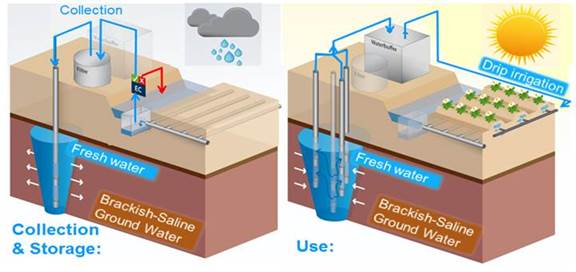Removal of plant pathogens in agricultural tile drainage water by managed aquifer recharge for reuse in irrigation
Research objectives
AGRIMAR – Managed Aquifer Recharge for Agriculture
Determine water quality after managed aquifer recharge (MAR) treatment regarding plant pathogens. Assess the microbial risk due to recycling of water to finally provide safe and sustainably produced fresh water for irrigation.
Project outline
Introduction
AGRIMAR investigates MAR technology that collects fresh tile drainage water for storage in aquifers, and retrieves it in summer for crop irrigation. The TDW may contain plant pathogens which could be present in the recycled water. To prevent the spread of crop diseases by contaminated irrigation water the survival of selected plant pathogens in the MAR system will be studied. We focus on three plant pathogenic bacteria, namely Ralstonia solanacearum (RS; wilt), Dickeya solina (DS; blackleg), and Pectobacterium carotovorum (PC; soft rot, blackleg) which are of high ecological and economical importance. The goal is to study the fate of the bacterial plant pathogens in the MAR system and predict their decline during soil passage to ensure that it is safe to use MAR treated water for irrigation.
The AGRIMAR research is conducted by two PhD studies. My PhD research is focussed on microbiological water quality treatment during agricultural MAR. I work in close collaboration with Emiel Kruisdijk (the second PhD in the AGRIMAR research). Emiel’s research is focused on the geochemical field characterization (including push-pull tests), regional MAR assessment and reactive transport modelling.
Approach
First, the pathogen fate will be studied in the lab with batch and column experiments, where the conditions of the aquifer will be simulated. The results of the bacterial survival will be used to model the die-off of the bacteria in saturated sediments using HYDRUS-1D and to predict their fate in the aquifer. Second, the removal of bacteria will be studied under field conditions at a MAR pilot location in the Netherlands. These results will be compared with the model predictions. To determine the risk MAR-treated water could pose for agriculture quantitative microbial risk assessment (QMRA) will be used. This includes dose-response experiments of the bacteria with susceptible plants to identify the acceptable risk level of plant pathogens in irrigation water.

MAR technology: Tile drainage water (TDW) is collected and stored (left) in the underlying sandy aquifer confined by clay (the hydrogeological situation in the region). In times of water needs (summer), the stored water is used for irrigation (right).
Scientific relevance
Transport processes in the soil are well studied for human pathogens but few is known about the transport and survival of plant pathogens. For the first time, transport process parameter estimation for plant pathogens in saturated sediments will be assessed. The results of the lab and field experiments combined with QMRA will show if MAR is a feasible technology to provide safe (contaminant free) irrigation water.
Social relevance
Fresh water is a scarce resource and especially in saline deltas like the Netherlands water availability for irrigation is limited. AGRIMAR proposes a local MAR system to secure fresh water with good water quality for agriculture. Therefore, the project faces a worldwide problem and we try to determine the conditions (QMRA) needed to apply the system for various environmental conditions. By providing pathogen free irrigation the spread of plant diseases will be reduced and loss of food crops is prevented.